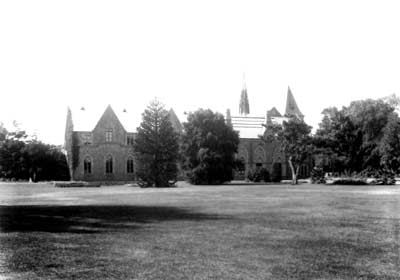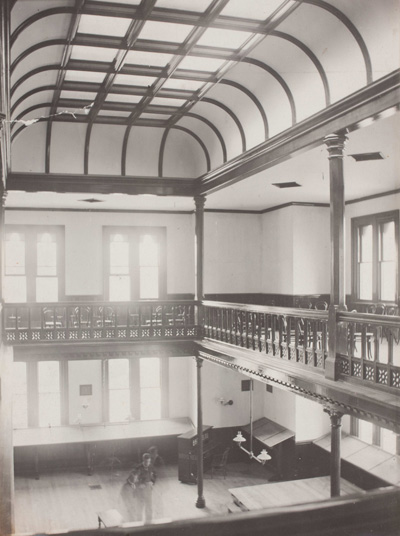Canterbury Museum and the Botanic Gardens, c.1920. The College Board initially wanted the College to be next to, or part of, the Museum buildings.

The College in the Clouds

Canterbury Museum and the Botanic Gardens, c.1920. The College Board initially wanted the College to be next to, or part of, the Museum buildings.
The physical location for Canterbury College was a subject of great debate in the 1870s. There was much support for the College being located within the developing educational precinct in the vicinity of Canterbury Museum, which was seen as the more senior and leading institution. To this end in 1873 the Provincial Government purchased an initial acre on the corner of Worcester and Antigua Streets (now Rolleston Ave). For some though, even this wasn’t close enough to the Museum. Alternative locations were proposed directly adjacent to, or even as part of, the Museum building in what is now the Botanic Gardens.
The debate over location and funding continued through into 1875, so that the College found itself after two years with three new professors but no dedicated buildings. When John Macmillan Brown, foundation Professor of English and Classics, arrived in Christchurch on Christmas Day 1874 he “was taken along to a fenced section on the corner opposite the Museum with an old wooden building standing on a mound of sand, and told that that was the College; somewhat in conflict with this demonstration, there was added the remark, ‘The College is in nubibus’ [in the clouds]. I made up my mind that I should not follow the example of the College but plant my feet firmly on the earth."

Interior of the Canterbury Public Library reading room, designed by Armson Collins, which opened in 1875. The College's first lectures were held in the Library.
Without any actual College buildings, the foundation professors began teaching in temporary accommodation provided by the Public Library (formerly the Mechanics’ Institute), the Oddfellows Hall, and in a room at the Museum.
A student of this period recalled in The College Review that the rooms in the Public Library “… were not handsome rooms, and a central table formed of several small ones of varying sizes, heights and degrees of dinginess, with a few chairs of most unpretentious character can hardly be termed luxurious furnishing.” In his opinion, the abiding characteristic of all the lecture rooms at this time was the amazing coldness of their atmosphere, and he noted that “overcoats were freely worn by students who sat shivering around the above-mentioned tables."
It would indeed have been cold to attend morning lectures in mid-winter, which began at 7.45am. Despite such hardships the fledgling College attracted a roll of 87 students, with men and women being admitted on an equal basis.